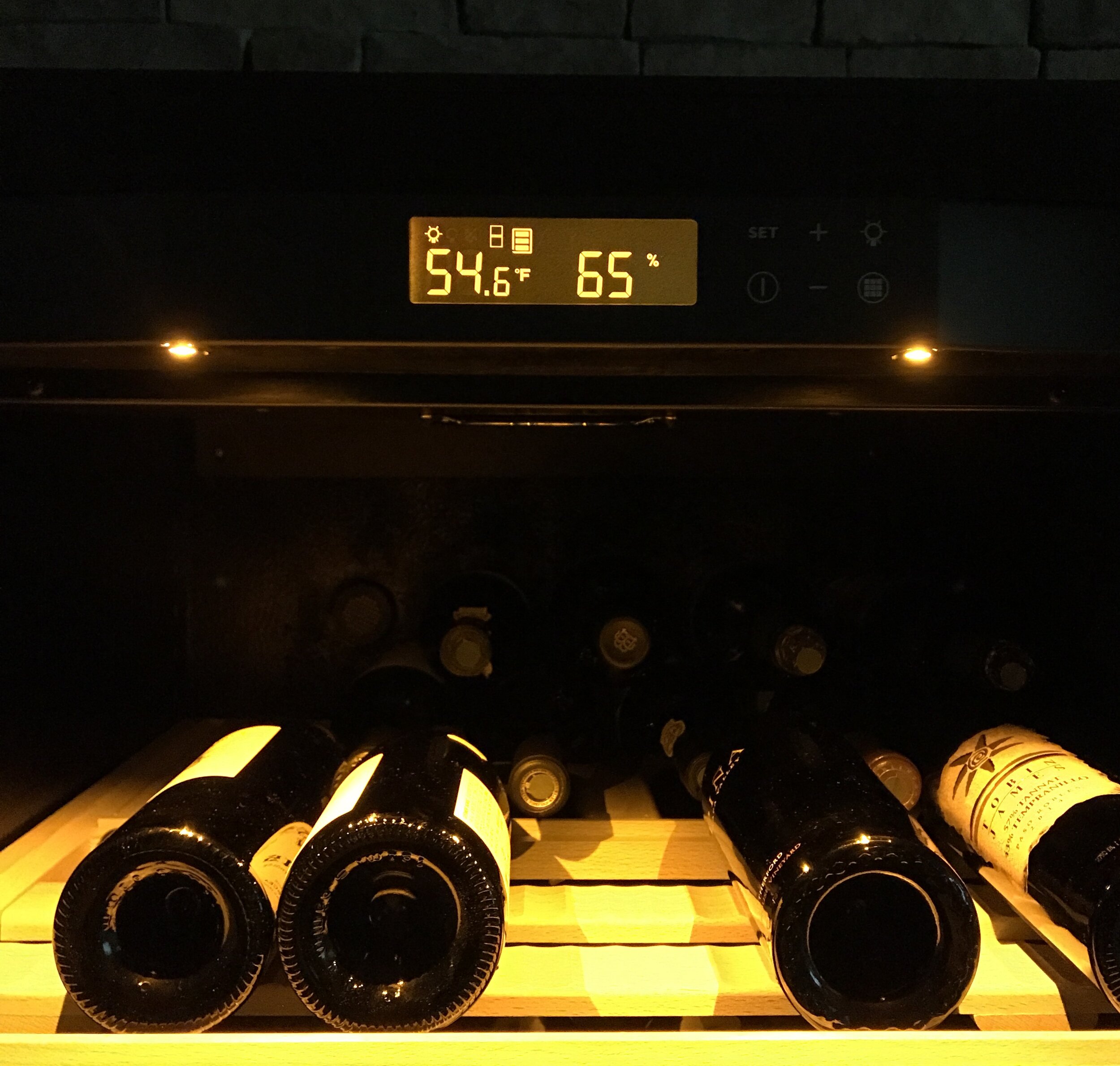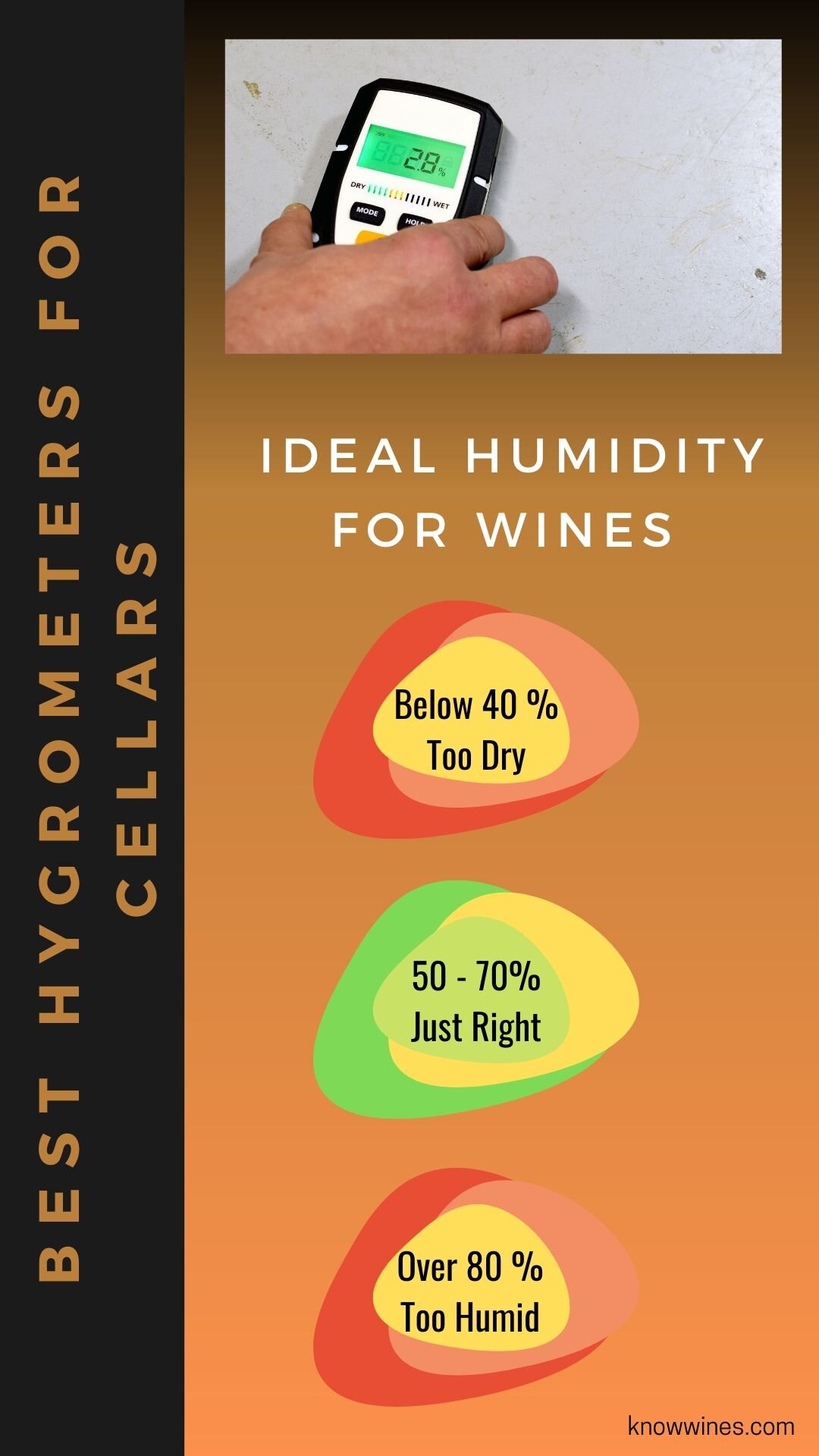So, you’ve taken the plunge and purchased a wine cooler. You’ve even started to fill it with wines you’d like to age. Or maybe you’ve purchased a home that has a wine cellar and don’t know the first thing about maintaining it. Or perhaps you’ve saved up for years and are converting an unfinished basement space to a wine cellar. First, congratulations! Collecting wine is a wonderful and rewarding pastime. Second, how much do you know about humidity? We’re asking because humidity is pretty important when it comes to aging wine. Here are some questions you should be asking yourself about your wine cooler or wine cellar:
What is the current humidity and how do I measure it?
Is the current humidity level good for my wines?
How do I monitor and adjust wine cellar humidity?
In today’s blog, we discuss the very best in hygrometers, the tool you’ll need for measuring humidity in your wine cellar. We also give you a mini-course in wine cellar humidity and how to control it so that your are creating the best possible space for your wines.
Before we continue with our recommendations, though, a little about the KnowWines blog. We are an Amazon.com affiliate and we do receive a small commission if you purchase items through our affiliate links at no cost to you. The commissions we receive help us pay for web hosting fees, products to test, and other costs associated with running this site. Thanks for using our affiliate links and supporting our independent blog!
What is a Hygrometer?
A hygrometer is a device that measures relative humidity in an enclosed space (such as a room, a wine cooler, a greenhouse, or a cigar humidor) or in a sample (as in a soil sample coming from a farm or vineyard).
The first crude hygrometer was invented by Leonardo da Vinci in the 1400s. These crude devices often comprised of a weight and an absorptive substance, like a sea sponge or a piece of wool!
What Does a Hygrometer Do?
A hygrometer measures the amount of water vapor in a given space, typically in a room or a confined space like a wine cooler. Since the amount of moisture air can hold varies by temperature, most hygrometers measure and display readings for both humidity and temperature.
A hygrometer will not take action to fix anything that might be wrong with the humidity in your wine refrigerator. It simply provides you with an accurate reading, and from that, you can take measures to increase or decrease humidity.
Do I Need a Hygrometer?
If you don’t have a space to store wine (such as a closet, wine refrigerator, or pantry), then you don’t need a hygrometer.
If you have a wine refrigerator or maturation cabinet like the EuroCave, it already has a temperature and humidity digital display, so you won’t need one.
If you have a closet, basement or wine cellar for storing wine, then purchasing a hygrometer is a good investment. It will enable you to measure the humidity in the enclosed space and thus, to correct too-high or too-dry conditions.
The Best Hygrometers on the Market
Best Analog Hygrometer for Wine Cellars or Wine Cabinet
This analog hygrometer for wine cellars or a wine cabinet is both functional and attractive. The wood case, ivory-colored dial, and elegant illustration of grapevines will add a bit of style to your wine storage space.
Best Digital Hygrometer for Wine Cellars or Wine Cabinet
This digital hygrometer is affordable, accurate, and conveniently sized for smaller spaces. It also has three mounting options: a tabletop stand, a magnetic backing, and a hole for hanging from the ceiling or wall.
Best Smart Hygrometer for Wine Cellars or Wine Cabinet
This smart, wireless hygrometer is simple and attractive by design. Also, if there’s a problem with the humidity in your wine cabinet, it will push a Bluetooth notification to your device to let you know.
Best Small and Inexpensive Hygrometer for Wine Cellars
This mini hygrometer fits any budget and is small enough to be inconspicuous, even in small spaces. The digital display makes it simple to instantly gauge the humidity of your wine cellar.
How to Calibrate a Hygrometer
If your hygrometer is not giving you the reading you expected, or if you inherited an old hygrometer and aren’t sure it’s accurate, you can calibrate it with one of these kits.
Alternatively, you can calibrate your hygrometer using a saturated salt calibration. It’s very inexpensive, requiring only a Ziploc bag, a lid from a water bottle or a bottle of orange juice, and some table salt. When following the saturated salt calibration, make sure to keep some distance from the salty solution and your hygrometer so that you don’t damage the hygrometer.
Here’s a step by step video on how to calibrate a hygrometer from cigar enthusiasts (the process is the same for calibrating wine hygrometers).
How to Increase Humidity in Wine Cellar
Too little humidity in your wine cellar can be a problem if you live in a dry, arid region like the desert of the Southwestern United States. Too little humidity could also be a seasonal challenge in places like the upper midwest, where spring, summer, and fall might be humid enough, but winter humidity can fall to 20% or so since the cold air can’t hold too much water vapor.
If you are in a dry area or have seasonal fluctuations in humidity, you may want to consider getting a humidity tray, like the kind people use who grow orchids and bonsai trees during the cold winter months. You will need to select a tray like this one that fits inside your wine cabinet or cellar. To use, simply fill the tray with charcoal, river rocks, and a little water. Monitor the humidity in your wine cellar every three days or so. If it goes up too high, simply remove water. If the humidity is still too low, simply add a little more water to the tray.
How to Decrease Humidity in Wine Cellar
Too much humidity in a wine cellar may stimulate the growth of mold and could cause the labels on your wine bottles to mold or get wrinkly. If you suspect too much humidity, first inspect your wine cabinet or cellar for any standing water in the corners or on the floor. Wipe up any excess moisture with a towel and fix any drainage issues the unit or room might have due to blockage of any tubes or a unit not being level on the floor. If, after a thorough inspection, you are still concerned about the amount of moisture, purchase some DampRid at your local home improvement store or online.
Hygrometer Wrap-Up
Hygrometers have been used for centuries to measure and monitor humidity in confined spaces. The ideal humidity for a wine cellar is between 50 and 70% (see the KnowWines chart below for a quick guide to ideal humidity!).
You don’t need a hygrometer if you store just a few wine bottles in your pantry. If your wine refrigerator has a digital humidity display you also don’t need a hygrometer.
If you have a wine cabinet or walk-in wine cellar that feels either too moist or too dry, purchasing a hygrometer and checking and monitoring the humidity is a great place to start troubleshooting.
Hygrometers are available in analog, digital, and “smart” versions. Smart versions connect to devices such as iPads or smartphones to enable monitoring.
If your humidity is too high, remedy the situation by absorbing excess water with a towel and absorptive material like DampRid. If the humidity is too low, use a tray filled with water to add moisture to the enclosed space.
And when you have the humidity in your wine cellar all figured out, just relax and enjoy your wine!
Cheers!









